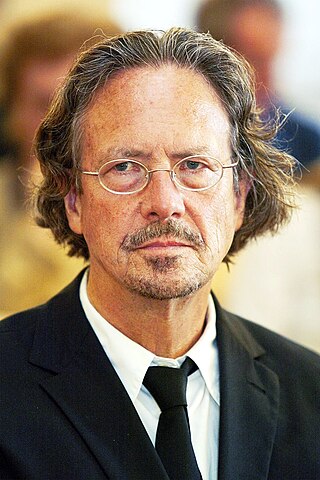Related Research Articles

The Nobel Prizes are five separate prizes awarded to those who, during the preceding year, have conferred the greatest benefit to humankind, as established by the 1895 will of Swedish chemist, engineer, and industrialist Alfred Nobel, in the year before he died. Prizes were first awarded in 1901 by the Nobel Foundation. Nobel's will indicated that the awards should be granted in the fields of Physics, Chemistry, Physiology or Medicine, Literature, and Peace. A sixth prize for Economic Sciences, endowed by Sweden's central bank, Sveriges Riksbank, and first presented in 1969, is also frequently included, as it is also administered by the Nobel Foundation. The Nobel Prizes are widely regarded as the most prestigious awards available in their respective fields.

Peter Handke is an Austrian novelist, playwright, translator, poet, film director, and screenwriter. He was awarded the 2019 Nobel Prize in Literature "for an influential work that with linguistic ingenuity has explored the periphery and the specificity of human experience." Handke is considered to be one of the most influential and original German-language writers in the second half of the 20th century.

René François Armand "Sully" Prudhomme was a French poet and essayist. He was the first winner of the Nobel Prize in Literature in 1901.
French literature generally speaking, is literature written in the French language, particularly by citizens of France; it may also refer to literature written by people living in France who speak traditional languages of France other than French. Literature written in the French language by citizens of other nations such as Belgium, Switzerland, Canada, Senegal, Tunisia, Algeria, Morocco, etc. is referred to as Francophone literature.
This article contains information about the literary events and publications of 1901.
Sully may refer to:
Nationality words link to articles with information on the nation's poetry or literature.
Nationality words link to articles with information on the nation's poetry or literature.
Events from the year 1907 in France.
Events from the year 1839 in France.

The Nobel Prize in Literature is a Swedish literature prize that is awarded annually, since 1901, to an author from any country who has, in the words of the will of Swedish industrialist Alfred Nobel, "in the field of literature, produced the most outstanding work in an idealistic direction". Though individual works are sometimes cited as being particularly noteworthy, the award is based on an author's body of work as a whole. The Swedish Academy decides who, if anyone, will receive the prize. The academy announces the name of the laureate in early October. It is one of the five Nobel Prizes established by the will of Alfred Nobel in 1895. Literature is traditionally the final award presented at the Nobel Prize ceremony. On some occasions, the award has been postponed to the following year, most recently in 2018.
Prudhomme or Prud'homme is a surname of French origin. The surname spread to the Canary Islands where it was Hispanicized to Perdomo. The surname spread to New Spain and is now common in Colombia, Venezuela, Cuba and Honduras.

The 1901 Nobel Prize in Literature was the first awarded Nobel Prize in Literature. It was awarded to the French poet Sully Prudhomme (1839–1907) "in special recognition of his poetic composition, which gives evidence of lofty idealism, artistic perfection and a rare combination of the qualities of both heart and intellect."

The 1902 Nobel Prize in Literature was the second prestigious literary award based upon Alfred Nobel's will, which was given to German historian Theodor Mommsen (1817–1903) "the greatest living master of the art of historical writing, with special reference to his monumental work A History of Rome."

The 1908 Nobel Prize in Literature was awarded to the German philosopher Rudolf Christoph Eucken (1846–1926) "in recognition of his earnest search for truth, his penetrating power of thought, his wide range of vision, and the warmth and strength in presentation with which in his numerous works he has vindicated and developed an idealistic philosophy of life." He is the second German to be awarded the prize and the first philosopher to be a recipient.

The 1993 Nobel Prize in Literature was awarded to the African-American novelist Toni Morrison (1931–2019) "who in novels characterized by visionary force and poetic import, gives life to an essential aspect of American reality." Morrison was awarded before the third novel of the Beloved Trilogy was published. She became the first black woman of any nationality and the second American woman to win the prize since Pearl S. Buck in 1938. She is also the 8th woman to receive the prize.

The 1906 Nobel Prize in Literature was awarded to the Italian poet Giosuè Carducci (1835–1907) "not only in consideration of his deep learning and critical research, but above all as a tribute to the creative energy, freshness of style, and lyrical force which characterize his poetic masterpieces." He was the first Italian author to receive the prize and was followed by Grazia Deledda in 1926.
References
- ↑ "The Nobel Prize in Literature 1901 - Sully Prudhomme". Nobelprize.org. Retrieved 22 February 2013.